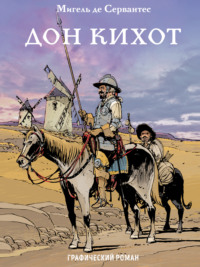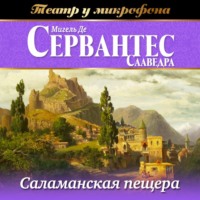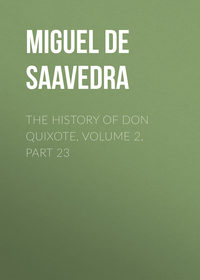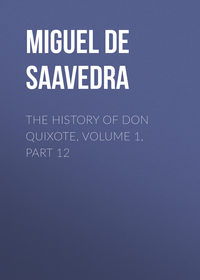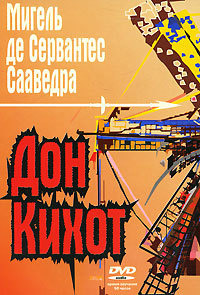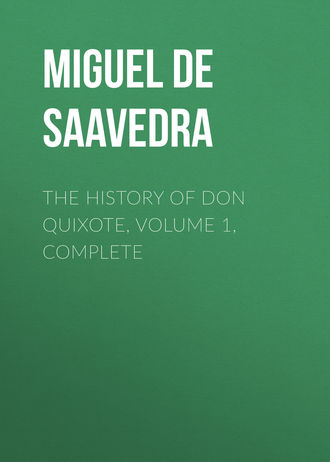 полная версия
полная версияПолная версия
The History of Don Quixote, Volume 1, Complete
Camilla was not long in recovering from her fainting fit and on coming to herself she said, “Why do you not go, Leonela, to call hither that friend, the falsest to his friend the sun ever shone upon or night concealed? Away, run, haste, speed! lest the fire of my wrath burn itself out with delay, and the righteous vengeance that I hope for melt away in menaces and maledictions.”
“I am just going to call him, senora,” said Leonela; “but you must first give me that dagger, lest while I am gone you should by means of it give cause to all who love you to weep all their lives.”
“Go in peace, dear Leonela, I will not do so,” said Camilla, “for rash and foolish as I may be, to your mind, in defending my honour, I am not going to be so much so as that Lucretia who they say killed herself without having done anything wrong, and without having first killed him on whom the guilt of her misfortune lay. I shall die, if I am to die; but it must be after full vengeance upon him who has brought me here to weep over audacity that no fault of mine gave birth to.”
Leonela required much pressing before she would go to summon Lothario, but at last she went, and while awaiting her return Camilla continued, as if speaking to herself, “Good God! would it not have been more prudent to have repulsed Lothario, as I have done many a time before, than to allow him, as I am now doing, to think me unchaste and vile, even for the short time I must wait until I undeceive him? No doubt it would have been better; but I should not be avenged, nor the honour of my husband vindicated, should he find so clear and easy an escape from the strait into which his depravity has led him. Let the traitor pay with his life for the temerity of his wanton wishes, and let the world know (if haply it shall ever come to know) that Camilla not only preserved her allegiance to her husband, but avenged him of the man who dared to wrong him. Still, I think it might be better to disclose this to Anselmo. But then I have called his attention to it in the letter I wrote to him in the country, and, if he did nothing to prevent the mischief I there pointed out to him, I suppose it was that from pure goodness of heart and trustfulness he would not and could not believe that any thought against his honour could harbour in the breast of so stanch a friend; nor indeed did I myself believe it for many days, nor should I have ever believed it if his insolence had not gone so far as to make it manifest by open presents, lavish promises, and ceaseless tears. But why do I argue thus? Does a bold determination stand in need of arguments? Surely not. Then traitors avaunt! Vengeance to my aid! Let the false one come, approach, advance, die, yield up his life, and then befall what may. Pure I came to him whom Heaven bestowed upon me, pure I shall leave him; and at the worst bathed in my own chaste blood and in the foul blood of the falsest friend that friendship ever saw in the world;” and as she uttered these words she paced the room holding the unsheathed dagger, with such irregular and disordered steps, and such gestures that one would have supposed her to have lost her senses, and taken her for some violent desperado instead of a delicate woman.
Anselmo, hidden behind some tapestries where he had concealed himself, beheld and was amazed at all, and already felt that what he had seen and heard was a sufficient answer to even greater suspicions; and he would have been now well pleased if the proof afforded by Lothario’s coming were dispensed with, as he feared some sudden mishap; but as he was on the point of showing himself and coming forth to embrace and undeceive his wife he paused as he saw Leonela returning, leading Lothario. Camilla when she saw him, drawing a long line in front of her on the floor with the dagger, said to him, “Lothario, pay attention to what I say to thee: if by any chance thou darest to cross this line thou seest, or even approach it, the instant I see thee attempt it that same instant will I pierce my bosom with this dagger that I hold in my hand; and before thou answerest me a word desire thee to listen to a few from me, and afterwards thou shalt reply as may please thee. First, I desire thee to tell me, Lothario, if thou knowest my husband Anselmo, and in what light thou regardest him; and secondly I desire to know if thou knowest me too. Answer me this, without embarrassment or reflecting deeply what thou wilt answer, for they are no riddles I put to thee.”
Lothario was not so dull but that from the first moment when Camilla directed him to make Anselmo hide himself he understood what she intended to do, and therefore he fell in with her idea so readily and promptly that between them they made the imposture look more true than truth; so he answered her thus: “I did not think, fair Camilla, that thou wert calling me to ask questions so remote from the object with which I come; but if it is to defer the promised reward thou art doing so, thou mightst have put it off still longer, for the longing for happiness gives the more distress the nearer comes the hope of gaining it; but lest thou shouldst say that I do not answer thy questions, I say that I know thy husband Anselmo, and that we have known each other from our earliest years; I will not speak of what thou too knowest, of our friendship, that I may not compel myself to testify against the wrong that love, the mighty excuse for greater errors, makes me inflict upon him. Thee I know and hold in the same estimation as he does, for were it not so I had not for a lesser prize acted in opposition to what I owe to my station and the holy laws of true friendship, now broken and violated by me through that powerful enemy, love.”
“If thou dost confess that,” returned Camilla, “mortal enemy of all that rightly deserves to be loved, with what face dost thou dare to come before one whom thou knowest to be the mirror wherein he is reflected on whom thou shouldst look to see how unworthily thou wrongest him? But, woe is me, I now comprehend what has made thee give so little heed to what thou owest to thyself; it must have been some freedom of mine, for I will not call it immodesty, as it did not proceed from any deliberate intention, but from some heedlessness such as women are guilty of through inadvertence when they think they have no occasion for reserve. But tell me, traitor, when did I by word or sign give a reply to thy prayers that could awaken in thee a shadow of hope of attaining thy base wishes? When were not thy professions of love sternly and scornfully rejected and rebuked? When were thy frequent pledges and still more frequent gifts believed or accepted? But as I am persuaded that no one can long persevere in the attempt to win love unsustained by some hope, I am willing to attribute to myself the blame of thy assurance, for no doubt some thoughtlessness of mine has all this time fostered thy hopes; and therefore will I punish myself and inflict upon myself the penalty thy guilt deserves. And that thou mayest see that being so relentless to myself I cannot possibly be otherwise to thee, I have summoned thee to be a witness of the sacrifice I mean to offer to the injured honour of my honoured husband, wronged by thee with all the assiduity thou wert capable of, and by me too through want of caution in avoiding every occasion, if I have given any, of encouraging and sanctioning thy base designs. Once more I say the suspicion in my mind that some imprudence of mine has engendered these lawless thoughts in thee, is what causes me most distress and what I desire most to punish with my own hands, for were any other instrument of punishment employed my error might become perhaps more widely known; but before I do so, in my death I mean to inflict death, and take with me one that will fully satisfy my longing for the revenge I hope for and have; for I shall see, wheresoever it may be that I go, the penalty awarded by inflexible, unswerving justice on him who has placed me in a position so desperate.”
As she uttered these words, with incredible energy and swiftness she flew upon Lothario with the naked dagger, so manifestly bent on burying it in his breast that he was almost uncertain whether these demonstrations were real or feigned, for he was obliged to have recourse to all his skill and strength to prevent her from striking him; and with such reality did she act this strange farce and mystification that, to give it a colour of truth, she determined to stain it with her own blood; for perceiving, or pretending, that she could not wound Lothario, she said, “Fate, it seems, will not grant my just desire complete satisfaction, but it will not be able to keep me from satisfying it partially at least;” and making an effort to free the hand with the dagger which Lothario held in his grasp, she released it, and directing the point to a place where it could not inflict a deep wound, she plunged it into her left side high up close to the shoulder, and then allowed herself to fall to the ground as if in a faint.
Leonela and Lothario stood amazed and astounded at the catastrophe, and seeing Camilla stretched on the ground and bathed in her blood they were still uncertain as to the true nature of the act. Lothario, terrified and breathless, ran in haste to pluck out the dagger; but when he saw how slight the wound was he was relieved of his fears and once more admired the subtlety, coolness, and ready wit of the fair Camilla; and the better to support the part he had to play he began to utter profuse and doleful lamentations over her body as if she were dead, invoking maledictions not only on himself but also on him who had been the means of placing him in such a position: and knowing that his friend Anselmo heard him he spoke in such a way as to make a listener feel much more pity for him than for Camilla, even though he supposed her dead. Leonela took her up in her arms and laid her on the bed, entreating Lothario to go in quest of some one to attend to her wound in secret, and at the same time asking his advice and opinion as to what they should say to Anselmo about his lady’s wound if he should chance to return before it was healed. He replied they might say what they liked, for he was not in a state to give advice that would be of any use; all he could tell her was to try and stanch the blood, as he was going where he should never more be seen; and with every appearance of deep grief and sorrow he left the house; but when he found himself alone, and where there was nobody to see him, he crossed himself unceasingly, lost in wonder at the adroitness of Camilla and the consistent acting of Leonela. He reflected how convinced Anselmo would be that he had a second Portia for a wife, and he looked forward anxiously to meeting him in order to rejoice together over falsehood and truth the most craftily veiled that could be imagined.
Leonela, as he told her, stanched her lady’s blood, which was no more than sufficed to support her deception; and washing the wound with a little wine she bound it up to the best of her skill, talking all the time she was tending her in a strain that, even if nothing else had been said before, would have been enough to assure Anselmo that he had in Camilla a model of purity. To Leonela’s words Camilla added her own, calling herself cowardly and wanting in spirit, since she had not enough at the time she had most need of it to rid herself of the life she so much loathed. She asked her attendant’s advice as to whether or not she ought to inform her beloved husband of all that had happened, but the other bade her say nothing about it, as she would lay upon him the obligation of taking vengeance on Lothario, which he could not do but at great risk to himself; and it was the duty of a true wife not to give her husband provocation to quarrel, but, on the contrary, to remove it as far as possible from him.
Camilla replied that she believed she was right and that she would follow her advice, but at any rate it would be well to consider how she was to explain the wound to Anselmo, for he could not help seeing it; to which Leonela answered that she did not know how to tell a lie even in jest.
“How then can I know, my dear?” said Camilla, “for I should not dare to forge or keep up a falsehood if my life depended on it. If we can think of no escape from this difficulty, it will be better to tell him the plain truth than that he should find us out in an untrue story.”
“Be not uneasy, senora,” said Leonela; “between this and to-morrow I will think of what we must say to him, and perhaps the wound being where it is it can be hidden from his sight, and Heaven will be pleased to aid us in a purpose so good and honourable. Compose yourself, senora, and endeavour to calm your excitement lest my lord find you agitated; and leave the rest to my care and God’s, who always supports good intentions.”
Anselmo had with the deepest attention listened to and seen played out the tragedy of the death of his honour, which the performers acted with such wonderfully effective truth that it seemed as if they had become the realities of the parts they played. He longed for night and an opportunity of escaping from the house to go and see his good friend Lothario, and with him give vent to his joy over the precious pearl he had gained in having established his wife’s purity. Both mistress and maid took care to give him time and opportunity to get away, and taking advantage of it he made his escape, and at once went in quest of Lothario, and it would be impossible to describe how he embraced him when he found him, and the things he said to him in the joy of his heart, and the praises he bestowed upon Camilla; all which Lothario listened to without being able to show any pleasure, for he could not forget how deceived his friend was, and how dishonourably he had wronged him; and though Anselmo could see that Lothario was not glad, still he imagined it was only because he had left Camilla wounded and had been himself the cause of it; and so among other things he told him not to be distressed about Camilla’s accident, for, as they had agreed to hide it from him, the wound was evidently trifling; and that being so, he had no cause for fear, but should henceforward be of good cheer and rejoice with him, seeing that by his means and adroitness he found himself raised to the greatest height of happiness that he could have ventured to hope for, and desired no better pastime than making verses in praise of Camilla that would preserve her name for all time to come. Lothario commended his purpose, and promised on his own part to aid him in raising a monument so glorious.
And so Anselmo was left the most charmingly hoodwinked man there could be in the world. He himself, persuaded he was conducting the instrument of his glory, led home by the hand of him who had been the utter destruction of his good name; whom Camilla received with averted countenance, though with smiles in her heart. The deception was carried on for some time, until at the end of a few months Fortune turned her wheel and the guilt which had been until then so skilfully concealed was published abroad, and Anselmo paid with his life the penalty of his ill-advised curiosity.
CHAPTER XXXV.
WHICH TREATS OF THE HEROIC AND PRODIGIOUS BATTLE DON QUIXOTE HAD WITH CERTAIN SKINS OF RED WINE, AND BRINGS THE NOVEL OF “THE ILL-ADVISED CURIOSITY” TO A CLOSE
There remained but little more of the novel to be read, when Sancho Panza burst forth in wild excitement from the garret where Don Quixote was lying, shouting, “Run, sirs! quick; and help my master, who is in the thick of the toughest and stiffest battle I ever laid eyes on. By the living God he has given the giant, the enemy of my lady the Princess Micomicona, such a slash that he has sliced his head clean off as if it were a turnip.”
“What are you talking about, brother?” said the curate, pausing as he was about to read the remainder of the novel. “Are you in your senses, Sancho? How the devil can it be as you say, when the giant is two thousand leagues away?”
Here they heard a loud noise in the chamber, and Don Quixote shouting out, “Stand, thief, brigand, villain; now I have got thee, and thy scimitar shall not avail thee!” And then it seemed as though he were slashing vigorously at the wall.
“Don’t stop to listen,” said Sancho, “but go in and part them or help my master: though there is no need of that now, for no doubt the giant is dead by this time and giving account to God of his past wicked life; for I saw the blood flowing on the ground, and the head cut off and fallen on one side, and it is as big as a large wine-skin.”
“May I die,” said the landlord at this, “if Don Quixote or Don Devil has not been slashing some of the skins of red wine that stand full at his bed’s head, and the spilt wine must be what this good fellow takes for blood;” and so saying he went into the room and the rest after him, and there they found Don Quixote in the strangest costume in the world. He was in his shirt, which was not long enough in front to cover his thighs completely and was six fingers shorter behind; his legs were very long and lean, covered with hair, and anything but clean; on his head he had a little greasy red cap that belonged to the host, round his left arm he had rolled the blanket of the bed, to which Sancho, for reasons best known to himself, owed a grudge, and in his right hand he held his unsheathed sword, with which he was slashing about on all sides, uttering exclamations as if he were actually fighting some giant: and the best of it was his eyes were not open, for he was fast asleep, and dreaming that he was doing battle with the giant. For his imagination was so wrought upon by the adventure he was going to accomplish, that it made him dream he had already reached the kingdom of Micomicon, and was engaged in combat with his enemy; and believing he was laying on the giant, he had given so many sword cuts to the skins that the whole room was full of wine. On seeing this the landlord was so enraged that he fell on Don Quixote, and with his clenched fist began to pummel him in such a way, that if Cardenio and the curate had not dragged him off, he would have brought the war of the giant to an end. But in spite of all the poor gentleman never woke until the barber brought a great pot of cold water from the well and flung it with one dash all over his body, on which Don Quixote woke up, but not so completely as to understand what was the matter. Dorothea, seeing how short and slight his attire was, would not go in to witness the battle between her champion and her opponent. As for Sancho, he went searching all over the floor for the head of the giant, and not finding it he said, “I see now that it’s all enchantment in this house; for the last time, on this very spot where I am now, I got ever so many thumps without knowing who gave them to me, or being able to see anybody; and now this head is not to be seen anywhere about, though I saw it cut off with my own eyes and the blood running from the body as if from a fountain.”
“What blood and fountains are you talking about, enemy of God and his saints?” said the landlord. “Don’t you see, you thief, that the blood and the fountain are only these skins here that have been stabbed and the red wine swimming all over the room? – and I wish I saw the soul of him that stabbed them swimming in hell.”
“I know nothing about that,” said Sancho; “all I know is it will be my bad luck that through not finding this head my county will melt away like salt in water;” – for Sancho awake was worse than his master asleep, so much had his master’s promises addled his wits.
The landlord was beside himself at the coolness of the squire and the mischievous doings of the master, and swore it should not be like the last time when they went without paying; and that their privileges of chivalry should not hold good this time to let one or other of them off without paying, even to the cost of the plugs that would have to be put to the damaged wine-skins. The curate was holding Don Quixote’s hands, who, fancying he had now ended the adventure and was in the presence of the Princess Micomicona, knelt before the curate and said, “Exalted and beauteous lady, your highness may live from this day forth fearless of any harm this base being could do you; and I too from this day forth am released from the promise I gave you, since by the help of God on high and by the favour of her by whom I live and breathe, I have fulfilled it so successfully.”
“Did not I say so?” said Sancho on hearing this. “You see I wasn’t drunk; there you see my master has already salted the giant; there’s no doubt about the bulls; my county is all right!”
Who could have helped laughing at the absurdities of the pair, master and man? And laugh they did, all except the landlord, who cursed himself; but at length the barber, Cardenio, and the curate contrived with no small trouble to get Don Quixote on the bed, and he fell asleep with every appearance of excessive weariness. They left him to sleep, and came out to the gate of the inn to console Sancho Panza on not having found the head of the giant; but much more work had they to appease the landlord, who was furious at the sudden death of his wine-skins; and said the landlady half scolding, half crying, “At an evil moment and in an unlucky hour he came into my house, this knight-errant – would that I had never set eyes on him, for dear he has cost me; the last time he went off with the overnight score against him for supper, bed, straw, and barley, for himself and his squire and a hack and an ass, saying he was a knight adventurer – God send unlucky adventures to him and all the adventurers in the world – and therefore not bound to pay anything, for it was so settled by the knight-errantry tariff: and then, all because of him, came the other gentleman and carried off my tail, and gives it back more than two cuartillos the worse, all stripped of its hair, so that it is no use for my husband’s purpose; and then, for a finishing touch to all, to burst my wine-skins and spill my wine! I wish I saw his own blood spilt! But let him not deceive himself, for, by the bones of my father and the shade of my mother, they shall pay me down every quarts; or my name is not what it is, and I am not my father’s daughter.” All this and more to the same effect the landlady delivered with great irritation, and her good maid Maritornes backed her up, while the daughter held her peace and smiled from time to time. The curate smoothed matters by promising to make good all losses to the best of his power, not only as regarded the wine-skins but also the wine, and above all the depreciation of the tail which they set such store by. Dorothea comforted Sancho, telling him that she pledged herself, as soon as it should appear certain that his master had decapitated the giant, and she found herself peacefully established in her kingdom, to bestow upon him the best county there was in it. With this Sancho consoled himself, and assured the princess she might rely upon it that he had seen the head of the giant, and more by token it had a beard that reached to the girdle, and that if it was not to be seen now it was because everything that happened in that house went by enchantment, as he himself had proved the last time he had lodged there. Dorothea said she fully believed it, and that he need not be uneasy, for all would go well and turn out as he wished. All therefore being appeased, the curate was anxious to go on with the novel, as he saw there was but little more left to read. Dorothea and the others begged him to finish it, and he, as he was willing to please them, and enjoyed reading it himself, continued the tale in these words:
The result was, that from the confidence Anselmo felt in Camilla’s virtue, he lived happy and free from anxiety, and Camilla purposely looked coldly on Lothario, that Anselmo might suppose her feelings towards him to be the opposite of what they were; and the better to support the position, Lothario begged to be excused from coming to the house, as the displeasure with which Camilla regarded his presence was plain to be seen. But the befooled Anselmo said he would on no account allow such a thing, and so in a thousand ways he became the author of his own dishonour, while he believed he was insuring his happiness. Meanwhile the satisfaction with which Leonela saw herself empowered to carry on her amour reached such a height that, regardless of everything else, she followed her inclinations unrestrainedly, feeling confident that her mistress would screen her, and even show her how to manage it safely. At last one night Anselmo heard footsteps in Leonela’s room, and on trying to enter to see who it was, he found that the door was held against him, which made him all the more determined to open it; and exerting his strength he forced it open, and entered the room in time to see a man leaping through the window into the street. He ran quickly to seize him or discover who he was, but he was unable to effect either purpose, for Leonela flung her arms round him crying, “Be calm, senor; do not give way to passion or follow him who has escaped from this; he belongs to me, and in fact he is my husband.”





